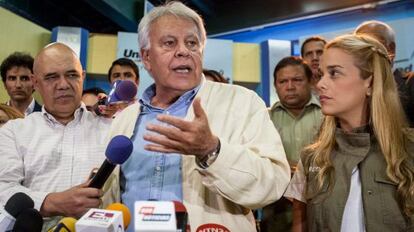González pushes for talks between Maduro and Venezuelan opposition
Former Spanish prime minister awaits government permission to meet jailed activists

Former Spanish Prime Minister Felipe González met members of the Venezuelan opposition on Monday to discuss the country’s political and economic crisis ahead of midterm elections that are due to be held later this year.
During the two-hour meeting between González and officials from the Democratic Unity Roundtable (MUD) – the coalition of opposition parties – the former Socialist Party leader made a series of conciliatory remarks, aiming to jump-start dialogue between President Nicolás Maduro and his opponents.
The ex-Socialist leader made a series of conciliatory remarks aimed at starting a national dialogue
Since his arrival in Caracas on Sunday, González has on several occasions praised Maduro’s pledge to hold parliamentary and regional elections later this year.
Although no date has been set, the Venezuelan leader has said it is up to the National Electoral Council (CNE) to schedule the vote.
González is in Venezuela to help in the defense of jailed opposition leaders Leopoldo López and Caracas Mayor Antonio Ledezma, who is under house arrest while he recovers from emergency surgery.
The former Spanish leader, who governed from 1982 to 1996, met with Ledezma at his home in Caracas, but is still waiting for the government’s permission to see López, who is being held at the Ramo Verde military prison outside the Venezuelan capital.
No date has been set for the midterm vote, but Maduro said it was up to election officials to schedule it
López and another political prisoner, former San Cristóbal Mayor Daniel Ceballos, went on hunger strike around two weeks ago to demand the release of jailed activists.
Both men are losing weight, according to their families, but are taking in water and other liquid nutrients.
González said his goal was to visit the prisoners, but would not do so without authorization from the Maduro government.
In the past, authorities have kept the former presidents of Colombia, Andrés Pastrana; Chile, Sebastián Piñeda; and Bolivia, Jorge Quiroga, from seeing López at Ramo Verde.
In March, González announced that he would defend López, who is facing sedition and conspiracy charges related to violent anti-government protests that took place in February 2004. But the Venezuelan government has told the former prime minister that, as a foreigner, he cannot litigate in court.
González was forced to cancel his previous travel plans on May 17, when the Maduro government suddenly postponed López’s trial. The closed-door court proceedings are expected to resume this week.
Maduro has accused González of working on behalf of coup-plotters. But government demonstrations to protest the former Spanish leader’s presence in Venezuela seemed to have subsided on Monday.
López’s wife, Lilian Tintori, who has embarked on an international campaign to win her husband’s release, was also present at the MUD meeting. One notable absence, however, was opposition leader María Corina Machado, a former National Assembly deputy who was kicked out of her parliamentary seat by the government.
González said his goal was to visit the prisoners, but he would not do so without authorization
Her Vente party is not an official member of the MUD coalition, but Machado forms part of the panel on an independent basis.
For years, Venezuela’s opposition has been deeply divided over strategies to accomplish a peaceful political transition.
Many in the coalition did not agree with a unilateral call made by López and Machado to hold anti-government protests in February 2014, causing deeper rifts in the faction.
The nationwide demonstrations left at least 40 people dead and many more injured. Widespread property damage was also reported.
Even with the opposition’s internal wounds still open, MUD leaders appear to be in better shape than they have been in many years to take advantage of a rare opportunity in Venezuela. With parliamentary elections on the horizon, Maduro’s approval rating has plummeted to 25 percent and some opinion polls put the opposition winning the elections by 15 percent.
After meeting with MUD officials, González delivered Petkoff’s Ortega y Gasset Journalism Prize award
After his meeting with MUD, González went to the home of TalCual editor Teodoro Petkoff to deliver the Ortega y Gasset Journalism Prize awarded to him last month by EL PAÍS.
The 83-year-old former Marxist guerrilla has been prohibited from leaving the country after several government officials, including National Assembly Speaker Diosdado Cabello, filed a series of defamation and libel suits against him for his news coverage.
In March, newspaper TalCual was forced to close its print edition and become a web-only venture after the government made it difficult for some publications to import newsprint.
Over the last 15 years, TalCual has challenged press self-censorship and restrictions during the previous Hugo Chávez and current Maduro administrations.
Tu suscripción se está usando en otro dispositivo
¿Quieres añadir otro usuario a tu suscripción?
Si continúas leyendo en este dispositivo, no se podrá leer en el otro.
FlechaTu suscripción se está usando en otro dispositivo y solo puedes acceder a EL PAÍS desde un dispositivo a la vez.
Si quieres compartir tu cuenta, cambia tu suscripción a la modalidad Premium, así podrás añadir otro usuario. Cada uno accederá con su propia cuenta de email, lo que os permitirá personalizar vuestra experiencia en EL PAÍS.
¿Tienes una suscripción de empresa? Accede aquí para contratar más cuentas.
En el caso de no saber quién está usando tu cuenta, te recomendamos cambiar tu contraseña aquí.
Si decides continuar compartiendo tu cuenta, este mensaje se mostrará en tu dispositivo y en el de la otra persona que está usando tu cuenta de forma indefinida, afectando a tu experiencia de lectura. Puedes consultar aquí los términos y condiciones de la suscripción digital.








































